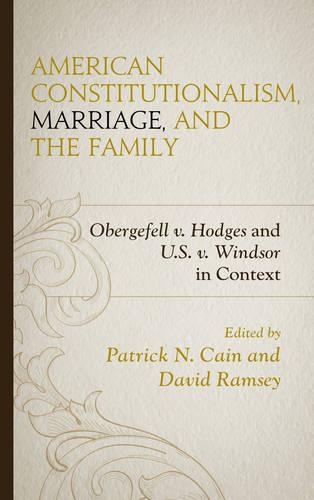
American Constitutionalism, Marriage, and the Family: Obergefell v. Hodges and U.S. v. Windsor in Context
(Paperback)
Available Formats
Publishing Details
American Constitutionalism, Marriage, and the Family: Obergefell v. Hodges and U.S. v. Windsor in Context
By (Author) Patrick N. Cain
Edited by David Ramsey
Edited by David Ramsey
Contributions by Stephen A. Block
Contributions by Patrick N. Cain
Contributions by Adam M. Carrington
Contributions by William C. Duncan
Contributions by Lauren Hall
Contributions by Terence J. Kleven
Contributions by Peter Lawler
Bloomsbury Publishing PLC
Lexington Books
11th September 2017
United States
Classifications
Professional and Scholarly
Non Fiction
Central / national / federal government
Sociology: family, kinship and relationships
346.730168
Physical Properties
Paperback
256
Width 150mm, Height 229mm, Spine 18mm
363g
Description
This edited volume in American constitutionalism places the Supreme Courts declaration of same-sex marriage rights in U.S. v. Windsor (2013) and Obergefell v. Hodges (2015) within the context of the Courts developing understanding of the legal and social status of marriage and the family. Leading scholars in the fields of political science, law, and religion examine the roots of the Courts affirmation of same-sex rights in a number of areas related to marriage and the family including the right to marry, equality and happiness in marriage, the right to privacy, freedom of association, property rights, parental power, and reproductive rights. Taken together, these essays evaluate the extent to which the Courts recent marriage rulings both break with and derive from the competing principles of American Constitutionalism.
Reviews
[This book] is essential reading for anyone who has an interest in the complicated legal, philosophical, and historical issues that are behind our contemporary debates about marriage and the family. Unfortunately, the way these debates are often conducted online, in public, and at universities and collegesusually accompanied by rhetorical excesses and personal recriminationsthey rarely reveal that the plausibility of each sides case depends on deeper principles that are far from uncontroversial. In this regard, American Constitutionalism, Marriage, and the Family is a breath of fresh air. * Interpretation *
The volume adds voices that manage to add something to a crowded conversation. Informed by a subtle and gentle skepticism toward the legal trajectory leading to Obergefell, they have something to offer both friends and foes of the stunning social and legal changes of the past half century. * American Political Thought *
Most citizens regard the Supreme Courts decisions in Windsor and Obergefell as an unqualified victory for an expanded view of marriage and the family. However, the essays in this book raise very thoughtful and provocative questions about the merits of the Courts reasoning and the consequences that the decision entails for the future.Most importantly, these essays reflect on a wide range of philosophical, political, and cultural implications for the Courts understanding of social institutions in general and the philosophical question of the familys compatibility with liberalism.Regardless of ones views regarding the proper constitution of marriage and the family, the reader will gain an enormous insight into this subject from the intellectual probity of this collection. -- J. David Alvis, Wofford College
The contemporary debate over marriage often begins and ends with the assumption that marriage is a matter of individual right or choice. The authors of this volume agree that this theory has long and distinguished pedigree in American law, but in a thoughtful and nuanced way they go on to show that this is much too simplistic view of our history. The law recognizes marriage not merely to affirm individual choices, but also because the institution of marriage serves important public purposes. By recovering this tradition, the authors encourage us to take a fresh and more sophisticated look at the role of marriage in contemporary society. We owe a great debt to these authors who have enriched both the public and the academic debate on this important issue. -- David Clinton, Baylor University
Author Bio
Patrick N. Cain is associate professor of political science at Lakehead University. David Ramsey is assistant professor of government and pre-law advisor at the University of West Florida.
